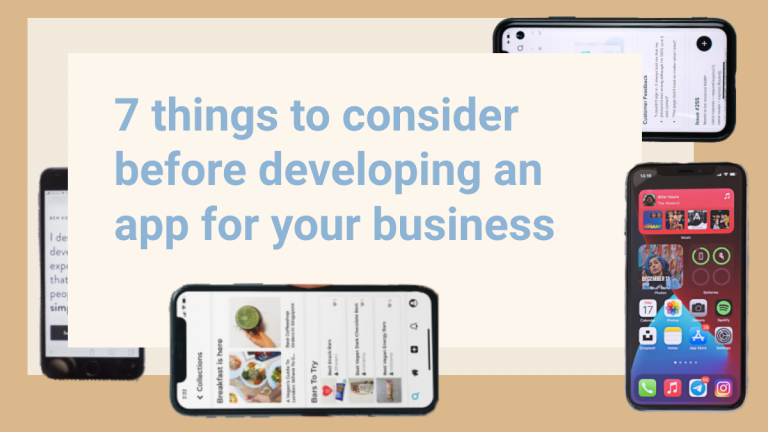Customer apps help a business to improve their brand awareness, customer loyalty and often create an additional stream of revenue. And more and more businesses are recognizing this. In a 2018 survey of 351 small businesses, 40% already had a mobile and 30% were planning to build one in the future. With the COVID-19 pandemic as consumers are shifting to online shopping, we can expect this trend to go further.
But as a business, you can’t simply rush into creating an app. Many elements need to come together to create a mobile that your customers will end up using. In this article, we explore seven things you need to consider before developing a mobile app for your business.
7 things to consider before developing a mobile app for your business
Business goals
This is the first factor you have to consider when developing a mobile app: what is your goal with this app? What do you aim to achieve?
For example, are you trying to sell products with this app? Are you trying to build a loyalty program for your stores? Or are you trying to develop an application for controlling your IoT devices?
Define measurable goals, metrics, and KPIs before building the application and develop a strategy for continuous improvement of these performance metrics.
Your business goals determine how the app will look like, how it will be marketed, what features you’ll need, the budget you’ll have to allocate, as well as the revenue model for the app.
Understand the customer demographic
Before you start developing your application, it’s important to understand your customers, what they like and what they don’t like. Understand where they’re from, the languages they speak, their age group, and how tech-savvy they are. And most importantly, what they’re expecting from an app.
Customer demographic will help you make decisions about the user interface, the support options your customers may need, and how you can position the app.
Depending on your budget, it may be worthwhile to invest in some surveys or studies to get a clear picture of your target audience. If the customers don’t use your app, it doesn’t matter how much you have invested in developing it.
And to ensure your customers use it, you have to develop an application that they can easily use and find value in.
Competing apps
Competitor analysis is important before you make any new revenue stream or a new business strategy. Before building an app, study your competitors’ apps, what they are offering, the features they have, and their key selling points.
While studying the competitors, make sure you explore the support they’re offering, their marketing strategy, and gain a complete picture.
Studying your competition will help you better develop your app, make sure it stands out and offers value to your customers. You can also find out what the other apps are lacking, the common customer complaints, and how you can position your application in the market.
Rules, regulations, and standards
Different industries have their own rules, regulations, and standards for customer-facing applications. For example, if you’re a healthcare brand in the US developing an appointment management app or a companion application for your EMR system, you’ll have to adhere to the HIPAA standards when storing patient data. If you’re developing a companion application for your IoT ecosystem, there are regulations regarding default passwords and storing user data.
Even if you’re selling house plants through your mobile app or building a VR app for your furniture business, even when your industry is not tightly regulated, there are global standards for mobile apps. And there are all-encompassing regional regulations for collecting, storing, and handling customer data.
Budget for building the app
Before building the app, you have to consider the budget and the revenue model for it. Besides just building the app, you also have to consider the maintenance cost for the lifecycle of the app. There will be significant expenses associated with hosting the app and sending regular updates and security patches.
The organization will also have to set aside a budget for marketing and ensuring that the customers are aware of the app and are using them.
If the organization doesn’t have previous experience building apps, it may be a good idea to work with a consultancy to estimate the cost. And it’s also important to have a clear strategy for generating revenue from the app.
App platforms
You have to decide where all do you want to launch the app; on Android phones, iOS phones, desktops, iPad, or more. If your target audience is composed of mostly android users, an Android app may be enough. But if a customer can’t use your product without a mobile application, you’ll have to develop both.
In some cases, for example, VR apps, phones may not have the necessary hardware, such as LiDAR sensors. For this, you’ll have to work with iPads or iPhones with the sensors alone.
In some cases, for example, if you’re a small business, it may be wise to start with a responsive web app. You can later follow up with dedicated mobile apps.
Choosing a development team
Large companies often go for their own development teams, hiring a team of developers and setting up an in-house team. But a better option would be to work with a software development company. And if they have expertise in developing the specific type of app you’re building? Even better. There are many reasons for this, but mainly it comes down to cost. With an external team, there are no unnecessary overheads, and the application is likely to be launched quicker. The team is already well in sync and has already worked together on multiple projects.
With an in-house team, it may take a while for everything to come on track. There will be a learning curve as the team adjusts to each other and understands each other well. And in the long run, it can create unnecessary overheads if the development slows down.




